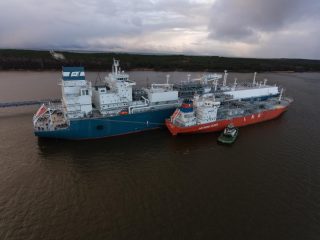Lithuanian Parliament on Tuesday approved the amendments of laws initiated by the Ministry of Energy, aimed at reducing the annual costs of LNG terminal operating costs by the acquisition of the FSRU vessel.
The Seimas approved the proposal regarding long-term LNG import by acquiring the FSRU vessel after 2024, Lithuania’s ministry of energy said in a statement.
This decision to secure the continuous supply of LNG enables optimization and reduction of the annual operating costs of the LNG terminal in the short term by €23-25 million ($26.2 to $28.5 million) each year, beginning as soon as mid-2019.
According to the law, Klaipėdos Nafta, the operator of the LNG terminal, will acquire the ownership of the FSRU vessel by December 31, 2024, by selecting the most economically beneficial proposal using an international tender.
Thus the operating costs of Klaipėda LNG terminal will be distributed not during a ten-year LNG-FSRU lease period like it is now, but during the entire planned period of operation of the LNG terminal, the ministry said.
Since the autumn of 2017, a detailed and independent technical and economic analysis has been conducted, potential scenarios have been discussed with experts, and the selected decision has been coordinated with a wide group of the parties concerned.
The economic benefits for Lithuania will reach from €60 million to €160 million per year, depending on the situation in the regional or national gas market.
In order to increase competition in the natural gas market and the emergence of new suppliers, it has been established that state-regulated energy producers will have to acquire at least 50 percent of gas in the natural gas exchange GET Baltic. So far, regulated energy producers had to buy gas supplied through Klaipėda LNG terminal from the designated supplier Litgas.
Preconditions for future gas acquisition at a more competitive price will also be created by the principles of completion and operation of the regional gas market, adopted by the Seimas. It lays a legal foundation for the integration of national gas markets of the Baltic countries, according to the energy ministry’s statement.
The new regional gas market will allow more efficient use of the natural gas infrastructure and reduction in gas transportation costs, thus enabling consumers to acquire gas at a better price.


